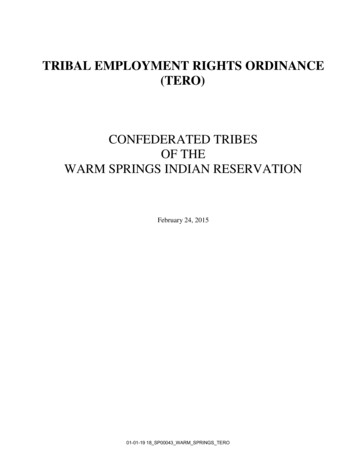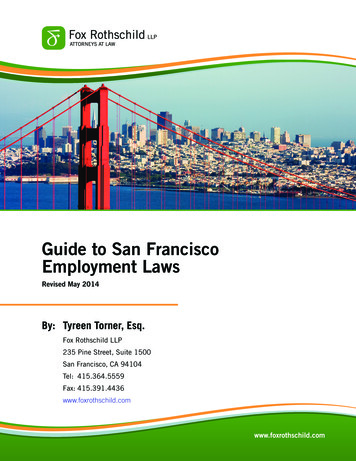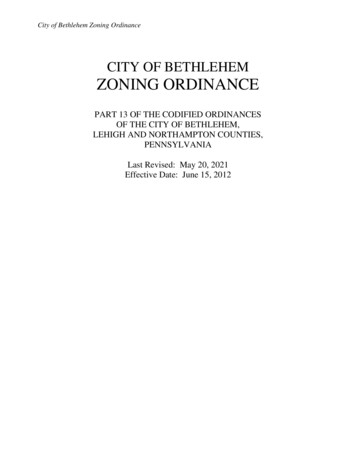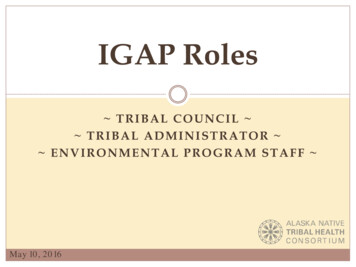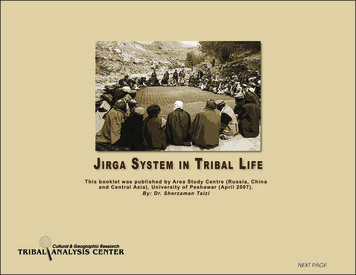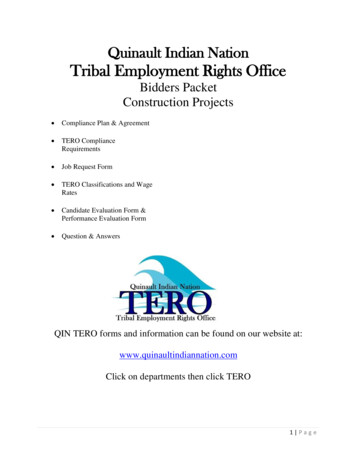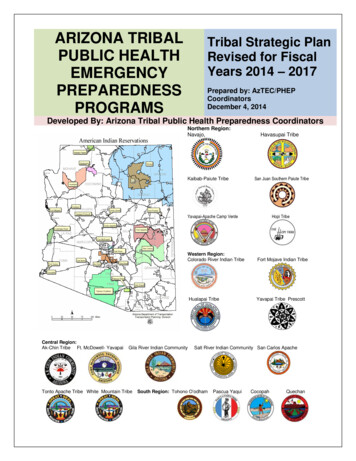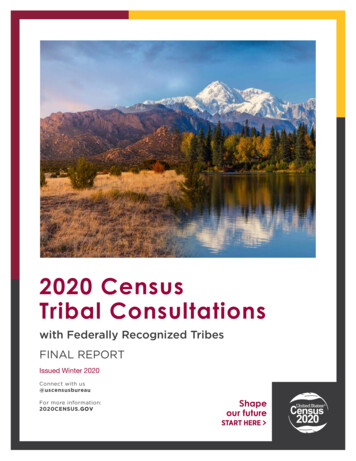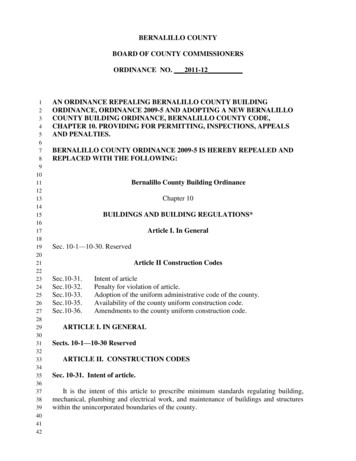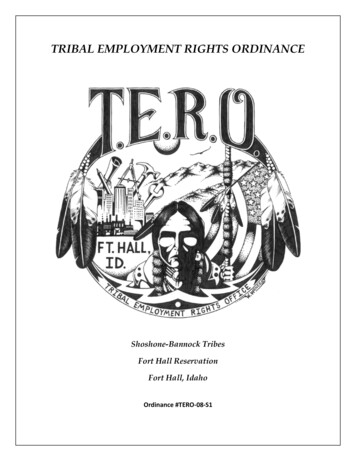
Transcription
TRIBAL EMPLOYMENT RIGHTS ORDINANCEShoshone-Bannock TribesFort Hall ReservationFort Hall, IdahoOrdinance #TERO‐08‐S1
SHOSHONE-BANNOCK TRIBESTRIBAL EMPLOYMENT RIGHTS ORDINANCETABLE OF CONTENTSCHAPTER 1 GENERAL PROVISIONSSection 101:TitleSection 102:FindingsSection 103:PurposesCHAPTER 2 DEFINITIONSSection 201:DefinitionsCHAPTER 3 COVERAGE AND SCOPESection 301:Coverage and ScopeSection 302:DisseminationSection 303:Indian Preference in Employment ActionsSection 304:Indian Preference in ContractingSection 305:Regulatory FeeSection 306:UnionCHAPTER 4 TERO COMMISSION ESTABLISHEDSection 401:Commission; Members; Compensation; QuorumSection 402:Powers of the CommissionSection 403:Ordinance Amendments and Administrative RegulationsSection 404:TERO Director; Qualifications; Staff; DutiesSection 405:Delegation of AuthoritySection 406:Intergovernmental RelationshipsCHAPTER 5 COMPLAINTS, APPEALS AND HEARINGSSection 501:ComplaintsSection 502:InvestigationsSection 503:Power to Require Testimony & Production of Records2
Section 504:EnforcementSection 505:AppealsSection 506:Confiscation and SaleCHAPTER 6 MISCELLANEOUSSection 601:SeverabilitySection 602:Ordinance Amendments and Administrative RegulationsSection 603:No Waiver of Sovereign ImmunitySection 604:Repeal3
SHOSHONE-BANNOCK TRIBESTRIBAL EMPLOYMENT RIGHTS ORDINANCECHAPTER 1GENERAL PROVISIONSSECTION 101TITLE.This Ordinance shall be known and cited as the Shoshone-Bannock Tribes Tribal Employment RightsOrdinance (“TERO”).SECTION 102DECLARATION OF POLICY AND FINDINGS.A. The public policy of the Shoshone-Bannock Tribes is declared to be as follows:Like land, water, and minerals, jobs, subcontracts and contracts on or near the Fort Hall Reservationare a vital resource for Indian people and Indians must utilize their inherent rights to obtain theirrightful share of such employment opportunities as they become available. The Fort Hall BusinessCouncil has the inherent sovereign power to pass laws to protect, preserve and enforce theemployment rights of Indians. Such a Tribal law is fully consistent with the federal laws adopted tocombat employment discrimination and empower Tribal people and businesses on or near the FortHall Reservation. The Shoshone-Bannock Tribes find it is critical to establish an employment rightsprogram and office in order to use this law to increase employment of Indian workers and businesses,and to eradicate discrimination against Indians.B. The Shoshone-Bannock Tribal Government has the inherent sovereign power to pass laws to protectthe interests, health, and general welfare of Indian people. The Fort Hall Business Council also hasauthority to protect these interests pursuant to Article VI, Section I (a), (g), (h), (i), (k), (l), (m), and(r) of the Shoshone-Bannock Tribes Constitution and Bylaws of the Fort Hall Reservation. The FortHall Business Council has determined that the Shoshone-Bannock Tribes have a compelling interestin adopting TERO to combat the high rate of unemployment on the Reservation and for the purposesset forth below.SECTION 103PURPOSES.The purposes of the TERO Ordinance include, but are not necessarily limited to:A. To ensure that no covered employer discriminates against any Tribal member or Indian in any aspectof employment, including but not limited to, hiring, promotion, demotion, transfer, change in workstatus, lay-offs, and termination from employment.B. To require that all covered employers give preference to qualified Indians in all aspects ofemployment, including but not limited to, hiring, promotion, demotion, transfer, changes in workstatus, lay-offs, and termination from employment.C. To require that all entities awarding contracts give preference to Certified Indian PreferenceContractors for contract and subcontract work on the Reservation.4
D. To require all covered employers to utilize the TERO Hiring Hall in all hiring with respect to work tobe performed on the Reservation.E. To require, in appropriate cases, that covered employers establish needed training programs intendedto combat the effects of discrimination.F. To provide services to covered employers to assist them in meeting their requirements under thisOrdinance, in locating qualified Indians to fill employment needs, establish needed training programsand meet federal requirements guarding against discrimination.G. To require all covered employers to contribute to the services provided by and the enforcement of thisOrdinance by the fees established herein.H. To authorize agreements between the Tribes and the United States or any of its agencies ordepartments to enforce federal laws prohibiting discrimination as set out and limited in thisOrdinance.I.To provide for staff support, travel and training of TERO Commissioners.J.To provide training and/or funding for training of Indians and Indian-owned businesses contingentupon the availability of funds.5
CHAPTER 2DEFINITIONSSECTION 201DEFINITIONS.As used in this Ordinance:A. “Business for Profit” means any business, enterprise, or operation, which is not defined as a501(c)(3) nonprofit or not-for-profit organization by the Internal Revenue Service.B. “Contract” means an agreement or promise, written or unwritten, between two or more personswhich creates an obligation enforceable by law to perform work, supply service, labor, or material(s).C. “Contractor” means any person, employer, or entity that enters a contract as defined herein toperform work, services, or other obligations where the person, employer, or entity has the primaryresponsibility for providing the work or services under the contract.D. “Commission” means the Shoshone-Bannock Tribal Employment Rights Ordinance Commission asestablished by this Ordinance.E. “Commissioner” means a Commissioner or member of the Shoshone-Bannock Tribes TribalEmployment Rights Ordinance Commission.F. “Covered Employer” means any employer employing two or more employees who, during anygiven period of time, perform work, or render services on or near the Reservation. Coveredemployers shall include units, departments, and divisions of the Shoshone-Bannock Tribalgovernment, Tribal enterprises and the gaming operation.G. “EEOC” means the United States Equal Employment Opportunity Commission.H. “Entity” means any person, partnership, corporation, joint venture, vendor, government,governmental enterprise, or any other natural or artificial person or organization. The term "entity" isintended to be broadly interpreted to further the purposes of the Ordinance.I.“Employee” means any person employed for remuneration, compensation, or other value.J.“Employer” means any person, partnership, corporation, or other entity that employs, for wages, twoor more employees. An Employer under this Ordinance does not include a private individual whocontracts or subcontracts work on his or her own private residence.K. “Fort Hall Business Council” means the elected governing body of the Shoshone-Bannock Tribes ofthe Fort Hall Reservation as established and defined by the Shoshone-Bannock Tribes’ Constitution.L. “Indian” means any person that is an enrolled member of a Federally-recognized Tribe.M. “Indian Preference Contractor” means a business firm, contractor, or subcontractor that is 51% ormore Indian owned, controlled, and managed, as recognized by the TERO Commission.N. “Ordinance” means the Tribal Employment Rights Ordinance.6
O. “Qualified Indian” means an enrolled Shoshone-Bannock Tribal Member, a non-enrolled member ordescendant of the Shoshone-Bannock Tribes, or an enrolled member or descendant of anotherFederally-recognized Indian Tribe who meets minimum qualifications for a specific job or otheremployment position.P. “Regulations” means administrative rules and guidelines established by the Commission to furtherthe provisions and administration of this Ordinance. The Ordinance governs the content andinterpretation of the regulations.Q. “Regulatory Fee” means fees collected by the TERO for the direct and indirect administration of theOrdinance and regulations; including but not limited to workforce development, Indian-owned andsmall business support activities.R. “Reservation” means all lands and waters within the present confines of the Fort Hall Reservation,notwithstanding the issuance of any patent, easement, or rights-of-way running through theReservation, ceded lands, and such other lands without such boundaries as may be added by purchase,exchange, transfer, gift or grant, or which are under the jurisdiction of the Tribes.S. Subcontractor” means any entity, usually a third party, hired or retained by a contractor, to performwork, supply services, or provide materials under a contract.T. “TERO” means the Tribal Employment Rights Ordinance.U. “Tribes” means the Shoshone-Bannock Tribes of the Fort Hall Reservation.V. “Tribal Court” means the Shoshone-Bannock Tribal Court of the Fort Hall Reservation.W. “Tribal Member” means an enrolled member of the Shoshone-Bannock Tribes.7
CHAPTER 3COVERAGE AND SCOPESECTION 301COVERAGE AND SCOPE.All covered employers shall comply with the regulations and orders of the Shoshone-Bannock TribalEmployment Rights Ordinance and Commission, which set forth the specific obligations of coveredemployers in regard to Indian Preference.SECTION 302DISSEMINATION.TERO shall make good faith efforts, through direct contact and general public information to inform allcovered employers, contractors, and any other entity on or near the Reservation of the requirements of theTERO. All bid announcements issued by any Tribal, Federal, State, or other private or public entity forwork within the exterior boundaries of the Reservation shall contain a statement that the successful bidderwill be obligated to comply with this Ordinance and that a bidder shall contact the TERO to obtaininformation regarding their obligation to comply with this Ordinance. It shall not be a defense in anyenforcement action for a covered employer, contractor, or other entity to allege that the Tribes failed tonotify the covered entity of the requirements of this Ordinance.SECTION 303INDIAN PREFERENCE IN EMPLOYMENT ACTIONS.All covered employers, for all employment activities occurring on or near the Reservation, shall givepreference in hiring, training, advancements, promotions, and lay-offs to qualified Indians, withpreferences in the following order:A. First preference to enrolled members of the Shoshone-Bannock Tribes in all hiring, promotion,training, layoffs, and all other aspects of employment;B. Second preference to non-enrolled members or descendants of the Shoshone-Bannock Tribes;C. Third preference to enrolled members or descendants of other Federally-recognized Indian Tribes;D. Fourth preference to non-Indians who have successful work experience with Indian Tribes; andE. Fifth preference to non-Indians.Preference in lay-offs means that qualified members of the Shoshone-Bannock Tribes shall be givenpreference for retention when lay-offs occur. As between qualified Indians subject to lay-offs, retentionpreference shall be given to qualified Indians in accordance with the above-listed preference order unlessthe lay-off is based upon significant employee performance and/or qualifications.SECTION 304INDIAN PREFERENCE IN CONTRACTING.A. All covered employers awarding contracts or subcontracts for supplies, services, labor, and/ormaterials in an amount of 5,000.00 or more shall give preference in contracting and subcontractingto qualified entities that are certified by the Commission as 51% or more Indian owned and controlled8
with a first preference to qualified entities that are 51% or more owned and controlled by qualifiedIndians in the preference order set forth in Section 303.B. These Indian Preference requirements shall apply to the award of contracts awarded directly by theShoshone-Bannock Tribes, its programs and divisions on any contract or subcontract of which workoccurs off the Reservation and involves work related to protection and preservation of treaty rightsand in which the Shoshone-Bannock Tribes or its programs and divisions have a direct interest.C. The Indian Preference requirements contained in this Ordinance shall be binding on all contractorsand subcontractors of covered employers and will be deemed to be part of and incorporated into anycontract or subcontract covered by this Ordinance. The covered employer shall have the initial andprimary responsibility for ensuring that all contractors and subcontractors comply with theserequirements.D. The above Indian Preference requirements apply in all cases except where specific percent ofownership or preference requirements are established by Tribal law for particular types ofemployment or contracting.E. Any exception from these Indian Preference in Contracting compliance requirements, or Indianpreference provisions in this Ordinance must be negotiated with and approved by the TEROCommission prior to any action being taken by the Fort Hall Business Council.SECTION 305REGULATORY FEE.A. The regulatory fee shall not apply to the daily operation of schools, churches, hospitals, health clinics,nursing homes, veterans’ centers, or the Tribal government, its enterprises and gaming operation.The Tribal government and entities are exempt from the regulatory fee, but all contractors orsubcontractors working for the Tribal government or its entities are assessed the regulatory fee.B. The regulatory fee is imposed as follows:1. Every contractor, or subcontractor awarded a contract by a covered employer in the sum of 25,000 or greater shall pay a one-time fee of 2.5% of the total amount of the contract. Thefee shall be paid prior to commencing work. However, where good cause is shown, theTERO Director may authorize a covered employer, contractor, or subcontractor to pay saidfee in installments over the course of the contract with the consent of the Commission.2. Every covered employer, except building or construction contractors, with two (2) or moreemployees working on the Reservation shall pay a quarterly fee of 1% of its employeesquarterly payroll which shall be paid within thirty (30) calendar day after the end of eachquarter.3. TERO shall be responsible for collecting Regulatory Fees pursuant to the rules andregulations adopted by the Commission. The fees shall be paid to the “Shoshone-BannockTERO Department” and shall be credited to the TERO Revenue line item in a restrictedTERO fund of the Shoshone-Bannock Tribes. Regulatory Fees collected shall be used for thedirect and indirect administration of this Ordinance and regulations; including but not limitedto, workforce development, Indian-owned and small business support activities.9
4. In the event a contract or subcontract terminates or cancels and is at least 85% complete, thecontract or subcontract is deemed 100% complete for purposes of imposing the RegulatoryFee.5. Any exceptions from the regulatory fee or Indian preference provisions in this Ordinancemust be negotiated with and approved by the TERO Commission prior to any action beingtaken by the Fort Hall Business Council.SECTION 306UNIONS.Prior to entering a collective bargaining agreement with any union(s), a covered employer must obtain awritten agreement from such union(s) stating that the union shall comply with this Ordinance and otherapplicable Tribal laws and regulations. Any such agreement shall be subject to the review of the TERODirector and approval of the Commission. Failure to comply with this requirement shall constitute aviolation of this Ordinance.10
CHAPTER 4TERO COMMISSION ESTABLISHEDSECTION 401COMMISSION; MEMBERS; COMPENSATION; QUORUM.A. There is created a Shoshone-Bannock Tribal Employment Rights Commission.B. The Commission shall be comprised of five (5) Commission Members and one (1) Alternate.Commissioners shall be appointed by the Fort Hall Business Council by Resolution. The Fort HallBusiness Council should make a substantial effort to appoint one (1) Commissioner who resides inand will represent each district within the Reservation (Bannock Creek, Fort Hall, Gibson, LincolnCreek, and Ross Fork Creek). The Fort Hall Business Council should make an effort to appointCommissioners who possess work experience with a covered employer and/or a level of knowledgeregarding this Ordinance and related matters. The Council should solicit appointee recommendationsfrom the Commission and applications from the Tribal membership.C. The Commission shall designate one of such Commissioners as Commission Chairperson, ViceChairperson, and Secretary. The Commissioners shall serve three-year, staggered terms. TheCommission shall adopt by-laws in accordance with this Ordinance to govern its activities andoperating procedures.D. Members of the Commission shall be entitled to receive, upon presentation of proper vouchers, suchmileage and per diem payments as determined by the Fort Hall Business Council and budgetaryallowances.E. A majority of the Commission shall constitute a quorum to transact business. When a vacancy occursin the Commission, the remaining members may exercise all the powers of the Commission until thevacancy is filled, provided that a quorum is met.SECTION 402POWERS OF THE COMMISSION.The Commission shall have the power, jurisdiction, and authority to:A. Enforce this Ordinance in accordance with Section 504 herein, and institute civil penalties for noncompliance as provided in this Ordinance.B. Formulate, promulgate, amend, and/or rescind rules, regulations, and guidelines necessary to carryout the provisions of this Ordinance.C. Review the decisions of the TERO Director in accordance with the enforcement provisions of thisOrdinance.D. Require each covered employer or entity to submit to the Commission an acceptable compliance planindicating how it will comply with this Ordinance, before a covered employer or entity maycommence work on or near the Fort Hall Reservation.E. Impose numerical hiring goals and timetables that specify the minimum number of Indians a coveredemployer must hire, by craft or skill level.11
F. Establish training programs to further the purposes of this Ordinance and establish fees to cover thecost of such programs.G. Require covered employers to establish or participate in such training programs, as the Commissiondetermines necessary in order to increase the pool of qualified Indians on the Reservation as quicklyas possible.H. Establish in conjunction with the Tribal employment and training programs, a Tribal hiring hall orskills bank and impose a requirement that no covered employer may hire a Non-Indian until theTribal hiring hall or bank has certified that no qualified Indian is available to fill the vacancy, with afirst preference to qualified Indians in accordance with Section 303 of this Ordinance.I.Prohibit covered employers from using qualification criteria or other personnel requirements thatserve as barriers to Indian employment unless the employer can demonstrate that such criteria orrequirements are required by business necessity. In developing regulations to implement thisrequirement, the Commission shall review and consider the EEOC guidelines on these matters to theextent that they are appropriate. The Commission shall have the right to impose its own requirementsin addition to or in lieu of EEOC guidelines when necessary to address unique qualification problemsconfronting Indians.J.To enter into agreements with unions to insure union compliance with this Ordinance.agreements shall in no way constitute recognition or endorsement of any union.SuchK. Impose contract and subcontract preference requirements in accordance with Section 303 and Section304 of this Ordinance, and establish and operate a system for certifying firms as eligible for Indianpreference.SECTION 403TERO DIRECTOR; QUALIFICATIONS; STAFF; DUTIES.A. The Fort Hall Business Council shall have the exclusive authority to hire the TERO Director.B. The Executive Director of the Shoshone-Bannock Tribes shall have the authority to direct, suspend,or remove the TERO Director for cause.C. The TERO Commission or the Executive Director may recommend to the Fort Hall Business Councilthe suspension or removal of the TERO Director for cause.D. The TERO Director shall have such administrative ability, education, and training as determined bythe Executive Director.E. The TERO Director shall have authority to hire staff and to expend funds appropriated by the FortHall Business Council. The TERO Director shall also have the authority to obtain and expendfunding from federal, state, and other sources to carry out the purposes of the Commission, subject toapproval by the Fort Hall Business Council.F. The TERO Director shall administer the policies, authorities, and duties prescribed to him or her bythe Commission pursuant to Section 402.12
G. The TERO Director shall have authority to issue notices of hearings and notices for witnesses toappear at Commission hearings and to secure any documents or items for such hearings.H. The TERO Director has authority to commence Tribal Court action to obtain injunctive relief andother civil remedies as necessary to preserve the rights of the beneficiaries of this Ordinance.SECTION 404DELEGATION OF AUTHORITY.The Commission may delegate to the TERO Director the authority to carry out the day-to-day operationsof the Commission and such other authority as is convenient or necessary to the efficient administrationof this Ordinance, except that the Commission may not delegate its power or duty to:A. Adopt, amend, and rescind rules, regulations, or guidelines; orB. To conduct hearings or to impose sanctions pursuant to Section 504.SECTION 405INTERGOVERNMENTAL RELATIONSHIPS.The TERO Director, acting under the direction of the Fort Hall Business Council, is authorized to enterinto cooperative memoranda of agreement or memoranda of understanding with federal employmentrights agencies (e.g. Equal Employment Opportunity Commission (EEOC) and Office of Federal ContractCompliance Program (OFCCP)) in order to eliminate discrimination against Indians on and off the FortHall Reservation.13
CHAPTER 5COMPLAINTS, APPEALS AND HEARINGSSECTION 501COMPLAINTS.Any individual, group of individuals, or organization that believes any covered employer, other entity, orthe Commission has violated any provision of this Ordinance or TERO regulation, may file a complaintwith the TERO Director within thirty (30) calendar days of the event or incident upon which thecomplaint is based. The complaint shall be in writing and shall provide such information that willreasonably enable the TERO Director to understand the general nature of complaint and carry out aninvestigation of the complaint.SECTION 502INVESTIGATIONS.A. The TERO Director or any TERO Field Compliance Officer designated by the TERO Director mayconduct an investigation under this Section on his or her own initiative where he or she has reason tobelieve that a violation of this Ordinance or TERO regulation has occurred. The TERO Director ordesignated Field Compliance Officer shall investigate every complaint filed with the TERO Directorwithin a reasonable time. Within twenty (20) calendar days after receipt of the complaint, the TERODirector shall provide the complaining party with a written report on the status of the complaint.B. The TERO Director and designated TERO Compliance Officer shall have the authority to conductinvestigations on the Reservation in accordance with this Ordinance and Tribal laws to determinewhether any covered employer or other covered entity has violated any provision of this Ordinance orany rule or order hereunder, and to aid in prescribing regulations pursuant to this Ordinance. TheTERO Director or his/her delegate may enter, during business hours, the place of business oremployment of any employer for the purpose of such reports as the TERO Director deems necessaryto monitor compliance with the requirements of this Ordinance or any rule or order hereunder. TheTERO Director, designated TERO Compliance Officer, and any TERO staff person conducting validinvestigation related activities under this Ordinance shall not be personally liable for such activities.The Commission may adopt regulations regarding the handling and treatment of proprietary andfinancial information obtained by TERO under this Ordinance.C. If after investigation the TERO Director finds reason to believe a violation of the Ordinance or TEROregulation has occurred, the TERO Director shall proceed in accordance with the provisions ofSection 504.SECTION 503POWER TO REQUIRE TESTIMONY & PRODUCTION OF RECORDS.For the purpose of investigations or hearings which, in the opinion of the TERO Director or theCommission, are necessary or required for the enforcement of this Ordinance, a Commissioner, the TERODirector, or any field Compliance Officer designated by the TERO Director may administer oaths oraffirmation, take evidence, and request the production of books, papers, contracts, agreements, or otherdocuments, records, or information which the TERO Director or the Commission deems relevant ormaterial to the inquiry. The TERO Director and the Commission may seek assistance from the TribalAttorneys Office to obtain a Tribal Court subpoena or subpoena duces tecum to compel the attendance ofwitnesses and production of documents pursuant to this section.14
SECTION 504ENFORCEMENT.A. Notice of Noncompliance. When, after conducting an investigation, initiated by a complaint pursuantto Section 501 or a self-initiated investigation pursuant to Section 502, the TERO Director has reasonto believe a violation of this Ordinance or TERO regulation has occurred, the TERO Director shallnotify the covered employer in writing specifying the alleged violation(s). The TERO Director maywithhold the name(s) of the complainant(s) if the TERO Director has reason to believe thecomplainant could reasonably be subjected to retaliation. The TERO Director shall seek to achievean informal settlement of the alleged violation. If an informal settlement of the complaint isunsuccessful, the TERO Director shall issue a formal notice of noncompliance in the form set forthbelow.B. Contents of Notice of Noncompliance. The formal notice of noncompliance shall:1. Set forth the general nature of the alleged violation and the steps that must be taken tocome into compliance; and2. Provide the covered employer with a reasonable time, but not longer than five (5)working days from the date of receipt of such notice, to comply, unless the TERODirector has reason to believe irreparable harm will occur during that period, in whichcase the TERO Director may require that compliance occur within fewer than fiveworking days.C. Voluntary Compliance; Request for Administrative Hearing. If a covered employer voluntarilycomplies with the terms of the notice of noncompliance, the TERO Director may consider thecomplaint resolved and notify the complaining party. If a covered employer fails or refuses tocomply with the terms of a notice of noncompliance, the covered employer or the TERO Directormay request a hearing before the Commission which shall be held no sooner than five (5) workingdays and not later then thirty calendar (30) days after the date for compliance set forth in the TERODirector’s notice of noncompliance, unless an expedited hearing is deemed necessary by theCommission to avoid irreparable harm. If a party fails or refuses to comply and a hearing is notrequested, the Commission may proceed pursuant to subsection F.D. Security given where Administrative Hearing requested. If a covered employer requests a hearingpursuant to subsection C, and the TERO Director has good cause to believe that there is a danger thatthe party requesting the hearing will remove itself or its property from the jurisdiction of theShoshone-Bannock Tribes prior to the hearing, the TERO Director may require the party to post abond with the Commission in an amount sufficient to cover such costs and damages as may beincurred or suffered by any complaining party. A surety on a bond or undertaking under thissubsection submits the surety to the jurisdiction of the Commission and Shoshone-Bannock TribalCourt. If a covered employer fails or refuses to post a required bond, the Commission may proceedpursuant to subsection F. The TERO Director may also petition the Shoshone-Bannock Tribal Courtfor such interim and injunctive relief as is appropriate to protect the rights of the Commission andother complaining parties during the pendency of the enforcement proceedings.E. Administrative Hearing Procedure Before Commission. Any hearing held pursuant to this Sectionshall be conducted by the Commission. The Commission shall adopt particular rules of procedure togovern administrative hearings before the Commission. The hearing procedures shall provide dueprocess as required by Tribal law. The Commission may adopt particular rules of procedure. Neitherthe Commission nor a hearing under this Section is subject to the Rules of Evidence unless the15
Commission otherwise orders. No stenographic record of a hearing under this Section is requiredunless specifically arranged in advance, and at the cost of the requesting party.F. Penalties for noncompliance. If after the hearing, the Commission determines that the violation(s)alleged in the complaint occurred and that the covered employer charged has failed to comply andotherwise has no adequate defense in law or fact, or, if no hearing is requested, the Commission may:1.2.3.4.5.6.7.8.Deny such covered employer the right to commence business on the Reservation;Suspend such covered employer's operation within the Reservation;Terminate such covered employer's operation within the Reservation;Deny the right of such covered employer to conduct any further business within theReservation;Impose a civil fine on such covered employer in an amount no less than 400 but not
TERO shall make good faith efforts, through direct contact and general public information to inform all covered employers, contractors, and any other entity on or near the Reservation of the requirements of the TERO. All bid announcements issued by any Tribal, Federal, State, or other private or public entity for
